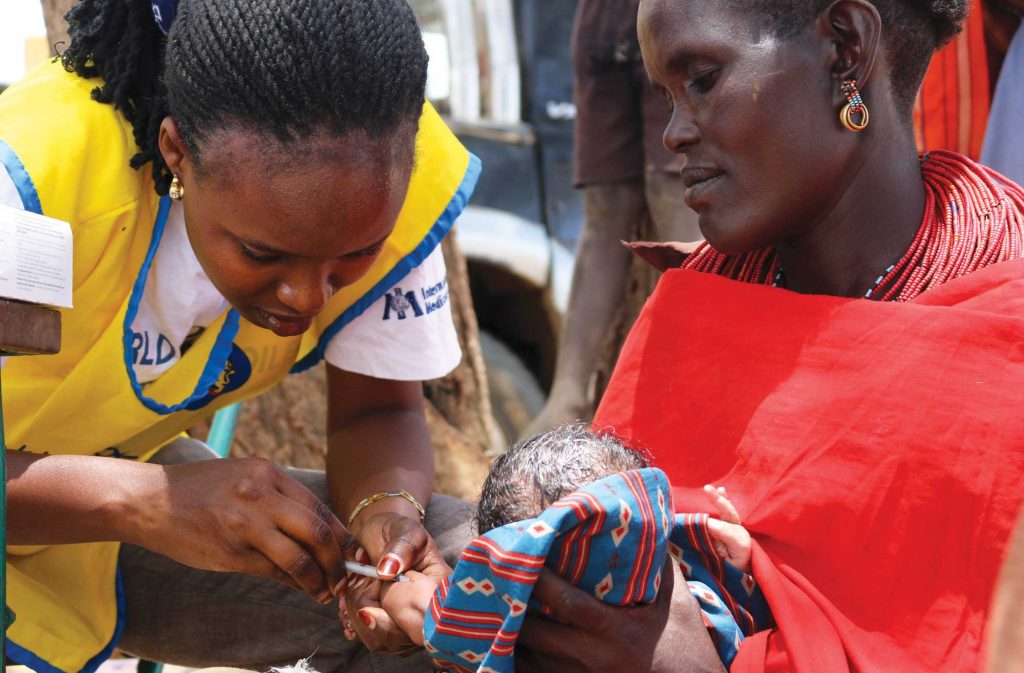
Family & Community Health
Families and communities remain central to the well-being of all who are part of them—from the very young to the very old. Family and community health programmes are crucial to meeting public health needs, especially for those living in fragile environments.
International Medical Corps works at the community level to promote health, prevent disease and ensure that all family members have the opportunity to survive and thrive. Our holistic approach ensures that even those living in precarious conditions can benefit from comprehensive, quality healthcare services. We also promote healthy habits and practices that can last a lifetime and contribute to building resilient communities.
As part of this process, International Medical Corps engages with local government and community leaders as partners to help local residents identify their own health priorities and needs, then explore the available local resources to meet them.
Areas of Focus
Overview
International Medical Corps works with the communities we serve and their leaders to promote and support programs and other efforts that improve access to basic health services.
We train community health workers (CHWs) and volunteers to provide health education to adults and adolescents to improve awareness and prevention of common diseases, such as pneumonia, malaria and diarrhoea. CHWs can also provide initial treatment such as oral rehydration solution for dehydration or antipyretics for fever, especially in children. CHWs strengthen access to basic healthcare by conducting household visits and referring community members to the local health centre for services, including antenatal care visits for pregnant women and routine immunisation for children. CHWs also play a critical role in controlling outbreaks of infectious disease: in addition to providing prevention messages, CHWs may conduct active disease surveillance by making household visits and referring those with symptoms to their local health facility for treatment.
Actively seeking out and involving community residents is key to implementing effective community-level programmes—which is why International Medical Corps pursues this approach at every stage of the program cycle. We believe that community ownership and stewardship are crucial ingredients for sustainable programmes that ultimately contribute to better health outcomes for all.
Key Stats
Overview
International Medical Corps works to help vulnerable communities worldwide prevent and respond to communicable diseases, including HIV/AIDS, tuberculosis and malaria, as well as non-communicable diseases such as diabetes, hypertension and mental health conditions.
In Africa, infectious diseases remain a leading cause of illness and death. Elsewhere, it is non-communicable disease that has become the main cause of illness and death, even though it receives far less attention than epidemics and emergency vaccination campaigns.
That said, more than 1 billion people each year are affected by infectious diseases—including neglected tropical illnesses that thrive in impoverished and marginalised communities, in conflict zones and in the overcrowded conditions that so often prevail in settlements for refugees and the internally displaced. In such places, poor sanitation, limited access to safe drinking water and often-inadequate health services combine to make conditions ideal for outbreaks of disease.
A significant number of International Medical Corps’ responses have included responses related to the treatment and control of epidemic diseases. Our staff members worldwide include physicians and public health specialists who coordinate health responses and engage in pandemic-preparedness activities.
At International Medical Corps, our goals are to:
- improve epidemiological surveillance, prevention and response to epidemic-prone diseases;
- contribute to health security and protection of vulnerable populations;
- contribute to the global target of ending HIV/AIDS as a public health threat by 2030;
- educate and inform populations on disease-control measures; and
- work with community partners to end practices that contribute to the spread of disease.
Key Stats
A Multi-Faceted Approach to Fighting Ebola
The fight to prevent and treat Ebola has changed greatly over the past 45 years—thanks in large part to the progress made by International Medical Corps and other organisations working to stop the deadly disease.
READ MORE